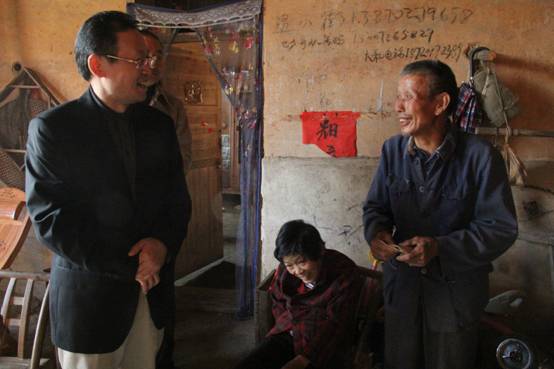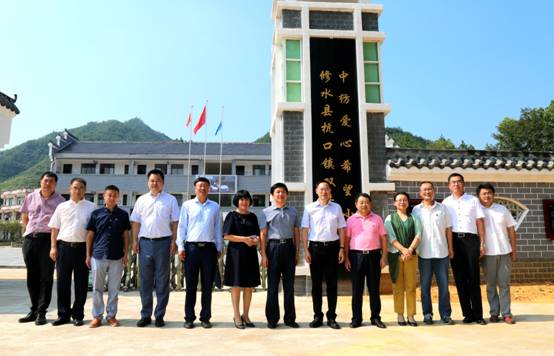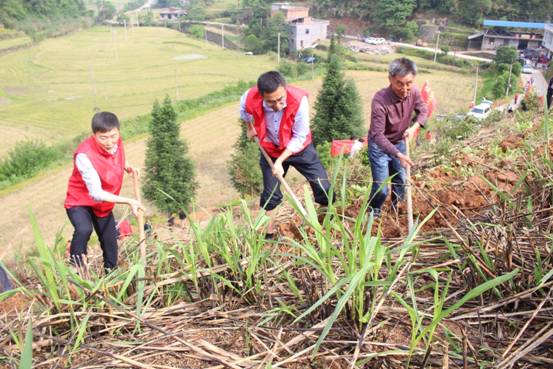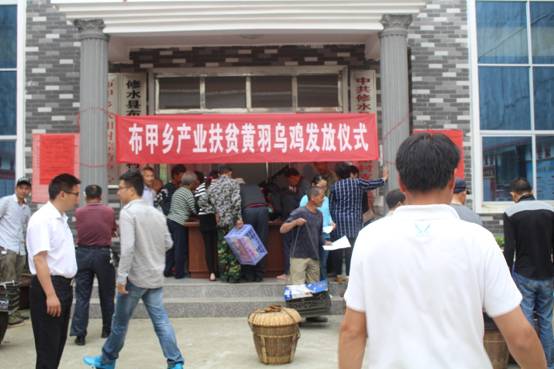Since the 18th National Congress of the Communist Party of China, the Party Central Committee with Comrade Xi Jinping as the core has issued a command to enter the army to "resolutely win the fight against poverty." Under the strong leadership of the Party Central Committee, the State Council and the Party Committee of the State-owned Assets Supervision and Administration Commission and the COFCO Party Group, China Textiles has taken a strong sense of political responsibility, social responsibility and mission to do a good job in poverty alleviation work in Xiushui County, Jiangxi Province. In the work of poverty alleviation, the company's party committee thoroughly implemented the instructions of the party group of COFCO to increase industrial poverty alleviation, insisted on giving fish more to fish, not only to increase blood production in poor areas, but also to actively explore the way of poverty alleviation. The result.

Mr. Qi Richeng, member of the party group, vice president and secretary of the China Textile Party Committee, visited the poor households in Shuangjing Village, Xiushui County
Bujia Township, Xiushui County is located in the northwest of Xiushui County. It is located at the junction of the two provinces of Guizhou and Hubei. The territory is dominated by mountains, the mountains are high and the resources are poor. The population of the township is nearly 10,000, and the poverty population is high. The high rate is the key township for poverty alleviation.
He shouldered the trust of the China Textile Party Committee. Liu Shuchuan, the company's post-help poverty alleviation cadre, the Standing Committee of the Xiushui County Party Committee and the deputy head of the county, went to Bujia Township to investigate the poverty alleviation work. After nearly a month of interviewing the poor, investigating households, and investigating the nostalgia, Liu Shuchuan felt that the people here are simple, the people are self-reliant, and the spirit of hard work is strong. However, lack of funds and lack of technology are very eager to lead the industry to lead everyone out of poverty.

Yu Xubo, deputy secretary of the party group and president of COFCO Group, accompanied by Yuan Fei (sixth from left), deputy secretary of the China Textile Party Committee and general manager of the company, visited Shuangjing Primary School, which was built by Chinese textiles.
The poor township of Bujia Township in the depths of the mountains has a natural resource reputation, which is 30,000 mu of wild cherry flowers. Because of the beauty of the cherry blossoms in the mountains and plains, Bujia Township has also been to CCTV, which is the mountain flower that the villagers are proud of. However, limited by the cherry varieties and the original rural economic development ideas, 30,000 acres of wild cherries can only see the flowers, and see the beauty of the income, has not been able to bring substantial changes to the villagers to get rid of poverty.
After careful and in-depth investigations by the poverty alleviation cadres, the China Textile Party Committee made a serious study and decided to make a fuss about the cherry industry in Bujia Township. It not only “reviews flowers” but also “results”, extending the cherry industry chain and increasing the income of the townspeople. After a multi-party discussion and discussion, we finally selected the cherry base of Dongling Temple in Jiujiang District of Jiujiang City, which is only 200 kilometers away from Xiushui County and has similar topography and location. It is the seedling grafting technology and technology of Bujia Township. Guide the base. In recent years, the Dongling Temple Commodity Cherry Base in Laoshan District has been developing tourism agriculture with the help of nearby Donglin Temple and Donglin Grand Canyon. The cherries produced each year are well known and in short supply, which has boosted the income of local farmers.
、
Liu Shuchuan, deputy head of China's textiles for poverty alleviation, led the township cadres to level the land at the commodity cherry base.
During the period, Liu Shuchuan, the deputy head of the county, went to Jiujiang Donglin Temple commodity cherry base several times and went through several months to inspect the township cadres, the seven administrative villages, the cadres of the two committees, the poverty-stricken households in Bujia Township, and the capable people with seedling planting experience. More than 200 people went to the cherry base to learn how to learn. The peasants at the two levels of the countryside are enthusiastic and enthusiastic, and are determined to lead the poor households in the township to do a big job and create a new world in the industry.
China Textile’s first 400,000 yuan support fund was quickly put in place. Liu Shuchuan, deputy head of the county, led a township party committee and a township government to hold a house meeting, a village meeting, and a large industry association. They solicited opinions and suggestions extensively, and considered everything from land transfer, capital operation, business model, and base management. Incorporating the concept of enterprise management, it is decided to take the grassroots party building as the guide, develop the industrial base as the first test, and develop the Bunjia town commodity cherry base in the form of cooperatives in the form of village collective shares, capable people and poor households.
The industry has been identified, and the development model and direction have been clarified. The next step is the site selection. Liu Shuchuan and the village cadres ran all over the village group houses in the seven administrative villages of the township. After many comparisons, the development base was placed in the cave village of Cherry Village. Dongshang Village has a good foundation for industrial development and a profound cultural heritage. It was called Cherry Source Society. There is also a cherry academy built by the Northern Song Dynasty poet and calligrapher Huang Tingjian's great-grandfather Huang Zhongli. Huang Tingjian also studied here. The unique natural resources and profound historical heritage are conducive to the large-scale planting and promotion of the future cloth cherries.
At the end of 2017, Bujia Township used China's textile industry poverty alleviation funds to purchase 1,000 varieties of cherry seedlings, 10,000 seedlings, and built a core base of 100 mu in Dongshang Village. In the form of “cooperatives + farmers”, 29 households were included. There are 8 poor households in Lika. This spring, 1000 seedlings began to test fruit. In order to improve economic efficiency, they also plant economic crops such as watermelon and tea at the base. Although the base was built, the poor households will soon have a profit. In the village of Dongshang, the ten groups set up a low-income household, Lu Fangxing, who took a stake of 4 mu of land and worked in the base. He earned 5,000 yuan in the first five months of this year. Before the shareholding, his annual income was only 4,000 yuan.
The successful operation of the 100-acre cherry base in Dongshang Village has opened the way for China's textile industry to help the poor in Xiushui County. It also quickly caused strong repercussions among the poor households in several administrative villages in the township. In 2018, China's textiles hit iron and iron, and then donated 400,000 yuan to the cherry industry. The plan is to develop the cherry industry in the three administrative villages of Sun, Painting Bay and Hengshan in Bujia Township. So far, 450 mu of planted area has been implemented. Poor households willing to develop their industries are all included. The cherry industry assisted by Chinese textiles also drove the rapid development of surrounding industries. The villagers Xiahanjiang, Zhao Xinxin, Lu Weimin and Leng Fenqi seized the opportunity to develop the cherry base and actively established the cherry seedling base, which also had considerable income.
While vigorously carrying out poverty alleviation in the cherry industry, China Textile is also actively exploring the possibility of poverty alleviation in other industries. Bujia Township is a typical mountainous township with a humid climate, fresh air and high forest coverage. The geographical environment is very suitable for the cultivation and growth of green agricultural and sideline products. Through investigation and investigation, the Wuji industry in Huangpi Township of Xiushui County is very suitable for promotion in Bujia Township. Huangqi Wuji has the characteristics of tender meat, strong aroma, delicious taste, sweet but not greasy, less fat, high lean meat rate, strong tonicity and good taste. The market prospect has been promising. In June 2017, China's textile investment fund was 100,000 yuan, and 30 households of poverty-stricken households in the township were provided with 30 black-brown seedlings for each household, so that poor households had industries and households had income. After nearly one year of trials, the black-bone culture has been successful, and the average household income per household has increased by 1,000 yuan. Hongshi Village 55-year-old Lika poor household Xie Qingyu counted an account. The 30 black chickens she farmed sold 23, according to the price of 50 yuan per kilogram, the income was more than 2000 yuan. This year, through her own incubation, she raised 50 black pheasants. She said happily: "Chicken eggs, eggs and chickens, with the help of China Textile, these black chickens are my passbook!

Huang Yu Wuji seedlings distribution ceremony
While the industry is helping the poor, China Textile has made great efforts to improve the poverty alleviation work in Xiushui County. It has invested more than 1.5 million yuan to build two Hope Primary Schools, and is building a rural primary school complex with an investment of 1 million yuan. It has invested more than 1.7 million yuan. A total of 4.5 kilometers of rural roads have been built to solve the problem of poverty-stricken households in the depths of the mountains. They have invested 600,000 yuan to carry out major illnesses and rescue work in the county, and more than 100 people have been assisted.
"To build a well-off society in an all-round way, one can't be less!" Under the leadership of the Party Group of COFCO, China Textile will be driven by the industry's poverty alleviation, and will continue to do a good job in poverty alleviation, in order to change the backwardness of poverty-stricken areas and become poor households in the county. Get rid of poverty as soon as possible, and contribute to the fight against poverty.